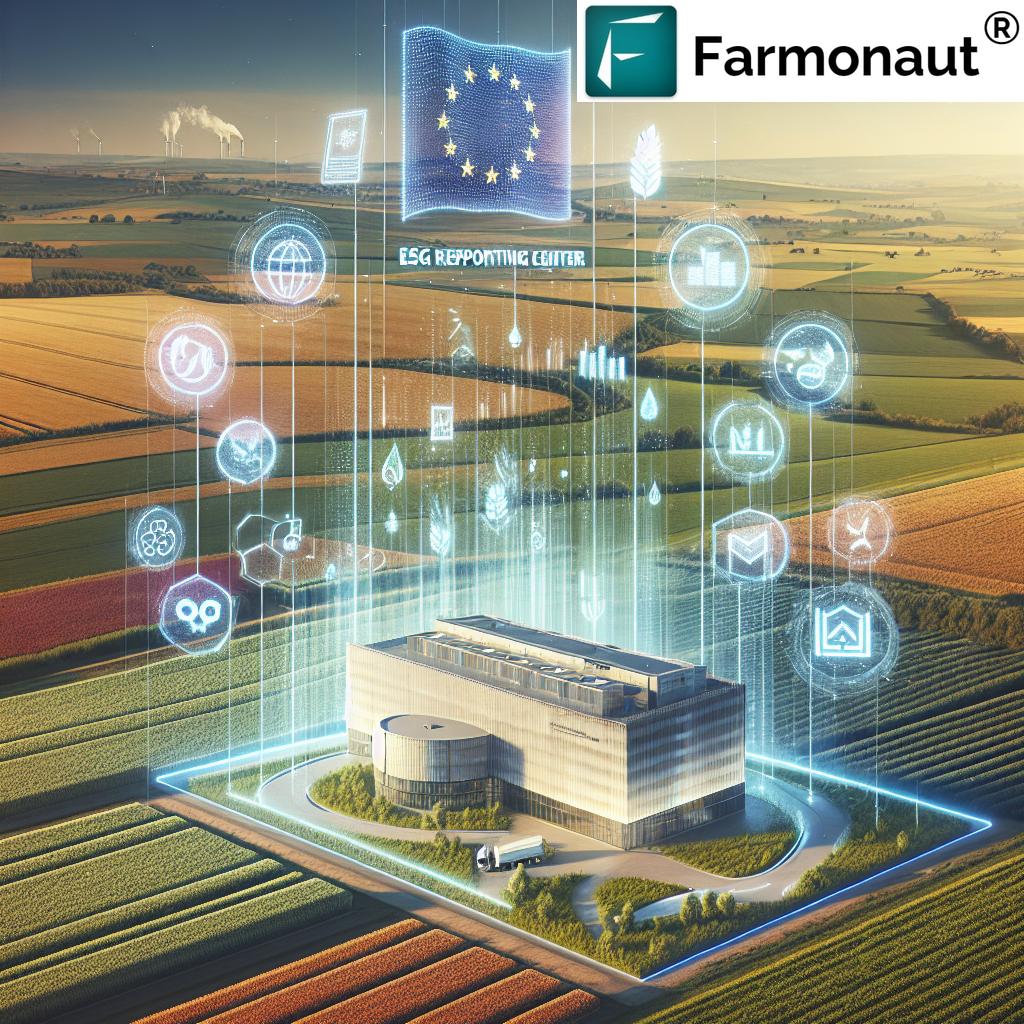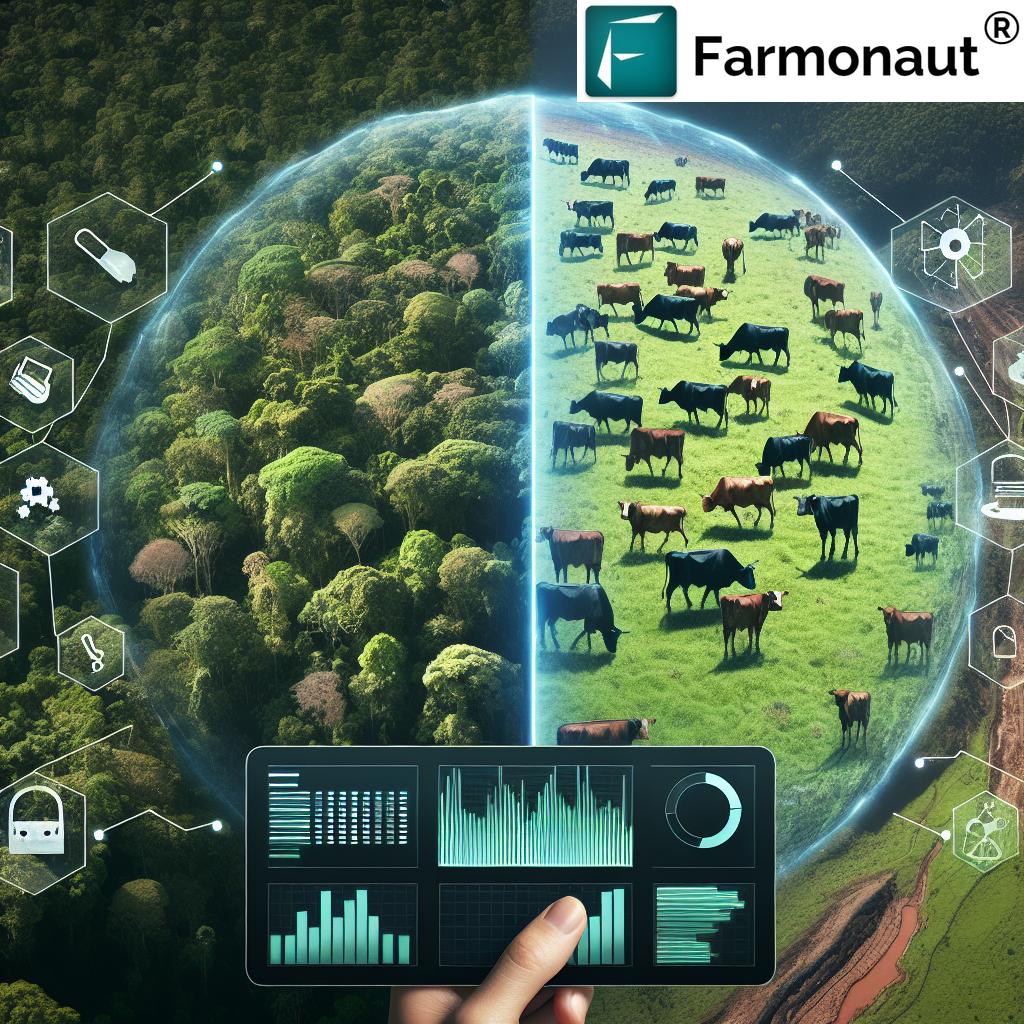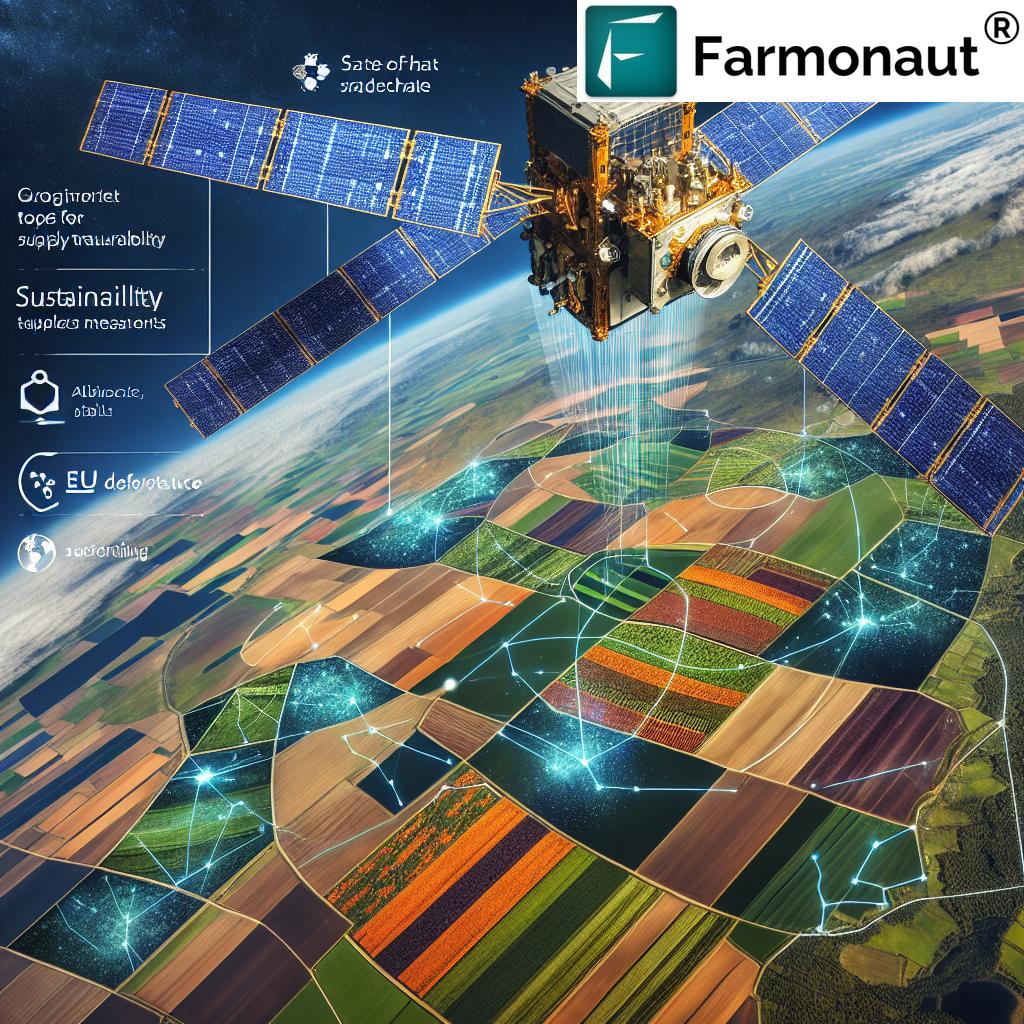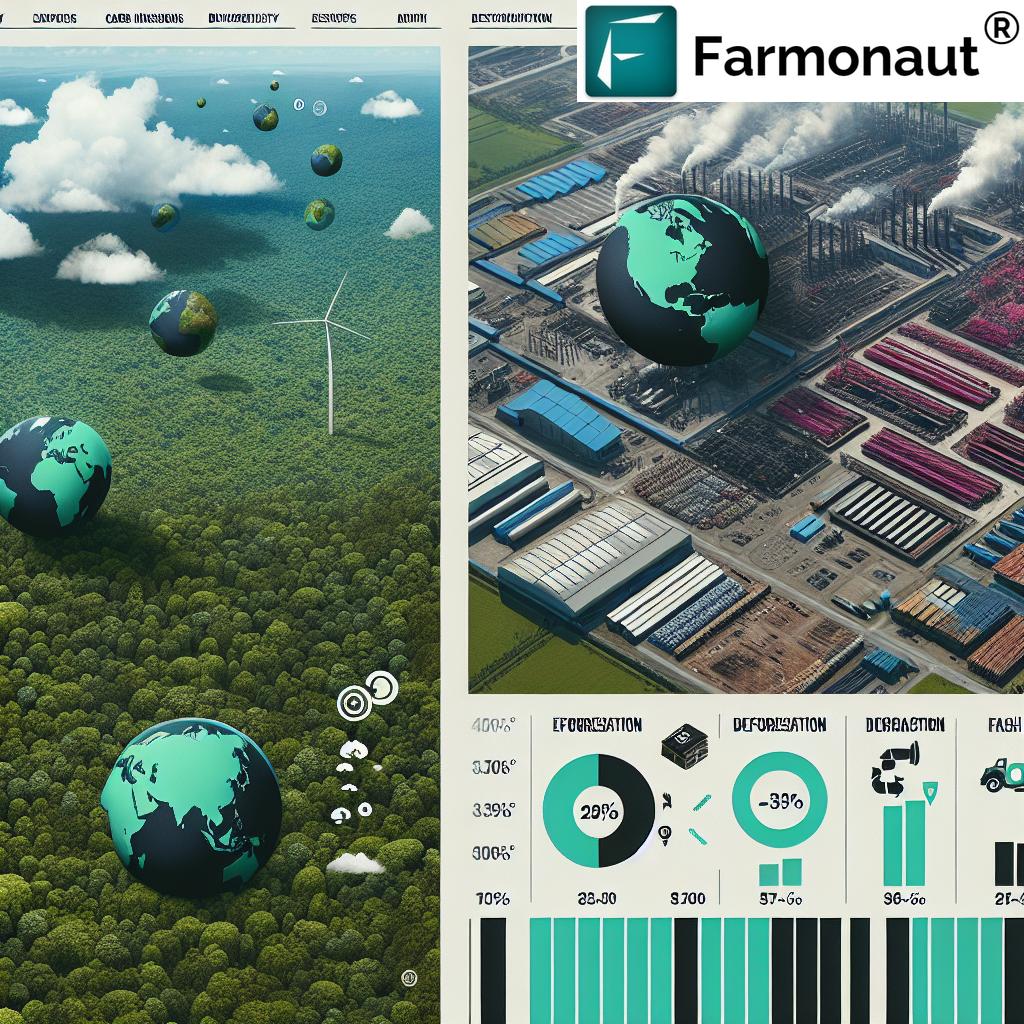Mastering EU Deforestation Regulation: Farmonaut’s Guide to Sustainable Agriculture and Corporate Compliance
“The EU Deforestation Regulation impacts 3 key areas: EUDR, CSRD, and CSDDD, reshaping agricultural sustainability practices.”
As we navigate the evolving landscape of agricultural sustainability and corporate responsibility, the European Union (EU) has taken significant strides in addressing one of the most pressing environmental challenges of our time – deforestation. At Farmonaut, we recognize the pivotal role that technology and informed practices play in shaping a sustainable future for agriculture. In this comprehensive guide, we’ll explore the intricacies of the EU Deforestation Regulation (EUDR) and its implications for sustainable agriculture and corporate compliance.
Understanding the EU Deforestation Regulation
The EU Deforestation Regulation represents a landmark shift in how businesses approach sustainability and environmental stewardship. As a cornerstone of the European Green Deal, this regulation aims to minimize the EU’s contribution to global deforestation and forest degradation through stringent import controls and due diligence requirements.
- Scope: The EUDR covers a wide range of commodities and derived products associated with deforestation risks.
- Implementation: Set to come into full effect by the end of 2024, with varying compliance deadlines for different business sizes.
- Key Requirements: Mandatory due diligence, traceability, and risk assessment for relevant supply chains.
For agricultural companies and businesses involved in the supply chains of affected commodities, understanding and preparing for EUDR compliance is crucial. This is where Farmonaut’s expertise in agricultural technology and sustainability services becomes invaluable.

The Broader Context: EU Sustainability Directives
To fully grasp the implications of the EUDR, it’s essential to understand its place within the broader framework of EU sustainability directives. Two other key regulations complement and reinforce the EUDR’s objectives:
1. Corporate Sustainability Reporting Directive (CSRD)
The CSRD expands and strengthens existing reporting requirements, mandating more detailed disclosures on companies’ environmental and social impacts. This directive aims to enhance transparency and accountability in corporate sustainability practices.
2. Corporate Sustainability Due Diligence Directive (CSDDD)
The CSDDD focuses on human rights and environmental impacts throughout global value chains. It requires companies to identify, prevent, and mitigate adverse impacts of their operations on people and the planet.
Together, these directives form a comprehensive framework for corporate sustainability in the EU, with far-reaching implications for businesses worldwide, especially those in the agricultural sector.
Farmonaut’s Approach to Sustainable Agriculture and Compliance
At Farmonaut, we leverage cutting-edge technology to support sustainable agriculture practices and help businesses navigate the complex landscape of EU sustainability regulations. Our suite of services is designed to address the key challenges posed by these directives:
- Satellite-Based Crop Monitoring: Our advanced satellite imagery technology enables precise monitoring of crop health and land use changes, crucial for demonstrating compliance with deforestation-free supply chain requirements.
- AI-Driven Advisory Systems: Our Jeevn AI provides personalized recommendations for sustainable farming practices, helping agricultural businesses optimize resource use and minimize environmental impact.
- Blockchain-Based Traceability: We offer robust supply chain traceability solutions, essential for meeting the due diligence requirements of the EUDR and CSDDD.
- Carbon Footprint Tracking: Our tools help businesses monitor and reduce their carbon emissions, aligning with the reporting requirements of the CSRD.
Explore our API for integrating these powerful tools into your existing systems, or check out our API Developer Docs for more details.
Key Services for EU Regulation Compliance
“Farmonaut’s guide covers 5 crucial services: EU alignment, compliance training, due diligence, ESG integration, and sustainability reporting.”
To help businesses navigate the complexities of EU sustainability regulations, we offer a comprehensive suite of services:
1. EU Alignment Assistance
Our team of experts provides tailored guidance on aligning your agricultural practices and supply chain management with EU regulations. We conduct thorough assessments of your current operations and develop strategic roadmaps for achieving compliance.
2. Sustainability Compliance Training
We offer specialized training programs to equip your team with the knowledge and skills needed to implement sustainable practices and meet regulatory requirements. Our training covers topics such as:
- Understanding EU sustainability directives
- Implementing effective due diligence processes
- Best practices for sustainable agriculture
- Using technology for compliance and reporting
3. Supply Chain Due Diligence
Our blockchain-based traceability solutions enable comprehensive supply chain mapping and risk assessment. We help you implement robust due diligence processes to identify and mitigate risks related to deforestation and human rights violations in your supply chain.
4. ESG Integration in Agriculture
We assist agricultural businesses in integrating Environmental, Social, and Governance (ESG) principles into their operations. Our services include:
- Materiality assessments to identify key ESG factors
- Development of ESG strategies and targets
- Implementation of ESG monitoring and reporting systems
5. Sustainability Reporting and Disclosure
Our advanced data analytics and reporting tools help you meet the comprehensive disclosure requirements of the CSRD. We assist in preparing detailed sustainability reports that align with EU standards and stakeholder expectations.

Implementing Sustainable Agriculture Practices
Compliance with EU regulations goes hand in hand with adopting sustainable agriculture practices. At Farmonaut, we advocate for and support the implementation of:
- Precision Agriculture: Using our satellite-based monitoring and AI advisory systems to optimize resource use and reduce environmental impact.
- Conservation Agriculture: Promoting practices that enhance soil health, biodiversity, and carbon sequestration.
- Agroforestry: Integrating trees and shrubs into croplands and pastures to create more sustainable and diverse agricultural ecosystems.
- Water Management: Implementing efficient irrigation systems and water conservation techniques.
- Integrated Pest Management: Reducing reliance on chemical pesticides through biological control and cultural practices.
These practices not only contribute to compliance with EU regulations but also enhance the long-term sustainability and resilience of agricultural operations.
Stakeholder Engagement and Materiality Assessment
A crucial aspect of complying with EU sustainability directives is engaging with stakeholders and conducting thorough materiality assessments. At Farmonaut, we guide businesses through this process:
Stakeholder Engagement in Agribusiness
Effective stakeholder engagement is essential for understanding diverse perspectives and aligning sustainability efforts with stakeholder expectations. Our approach includes:
- Identifying key stakeholders across the agricultural value chain
- Developing engagement strategies tailored to different stakeholder groups
- Facilitating dialogue and collaboration on sustainability issues
- Incorporating stakeholder feedback into sustainability strategies and reporting
Materiality Assessment for Agritech
A materiality assessment helps identify the most significant environmental, social, and governance issues for your business and stakeholders. Our process involves:
- Comprehensive analysis of potential ESG impacts specific to agriculture and agritech
- Stakeholder surveys and interviews to gauge priorities
- Mapping of material issues against business objectives and regulatory requirements
- Development of a materiality matrix to guide sustainability strategy and reporting
By focusing on material issues, businesses can allocate resources more effectively and ensure their sustainability efforts address the most critical areas of impact and stakeholder concern.
Environmental Impact Management in Agriculture
Managing environmental impacts is at the heart of EU sustainability regulations. For agricultural businesses, this means implementing comprehensive strategies to monitor, reduce, and report on their environmental footprint. Farmonaut’s technology-driven solutions support this effort through:
- Land Use Monitoring: Our satellite imagery technology enables precise tracking of land use changes, crucial for demonstrating compliance with deforestation-free requirements.
- Biodiversity Assessment: We provide tools for mapping and monitoring biodiversity on agricultural lands, supporting conservation efforts and compliance reporting.
- Soil Health Management: Our AI-driven advisory system offers recommendations for soil conservation practices, enhancing long-term sustainability.
- Greenhouse Gas Emissions Tracking: Our carbon footprint monitoring tools help businesses quantify and reduce their emissions, aligning with CSRD reporting requirements.
Access our comprehensive suite of tools through our  or download our mobile apps:
or download our mobile apps:


Navigating Supply Chain Due Diligence
The EUDR and CSDDD place significant emphasis on supply chain due diligence. For agricultural companies, this means implementing robust systems to trace products from field to market and assess risks along the way. Farmonaut’s blockchain-based traceability solutions offer:
- End-to-end supply chain mapping
- Real-time tracking of product movement
- Risk assessment and alerting mechanisms
- Secure, tamper-proof record-keeping
By leveraging these technologies, businesses can demonstrate compliance with due diligence requirements and build trust with consumers and regulators alike.
Transparent and Accurate Reporting
The CSRD’s expanded reporting requirements underscore the need for transparent and accurate sustainability disclosure. Farmonaut’s data analytics and reporting tools support this by:
- Aggregating data from multiple sources across agricultural operations
- Generating customized reports aligned with EU reporting standards
- Providing visual dashboards for easy interpretation of sustainability metrics
- Ensuring data integrity through our blockchain-based systems
Accurate reporting not only ensures compliance but also drives continuous improvement in sustainability performance.
EU Sustainability Regulations Comparison
| Regulation | Implementation Date | Primary Focus | Key Requirements | Affected Industries | Compliance Strategies |
|---|---|---|---|---|---|
| EU Deforestation Regulation (EUDR) | End of 2024 | Preventing deforestation-linked products from entering EU market | Due diligence, traceability, risk assessment | Agriculture, forestry, food, textiles | Supply chain mapping, satellite monitoring, blockchain traceability |
| Corporate Sustainability Reporting Directive (CSRD) | Phased from 2024 to 2028 | Enhanced sustainability reporting and disclosure | Detailed ESG reporting, double materiality assessment | All large companies and listed SMEs | ESG data collection, materiality assessment, stakeholder engagement |
| Corporate Sustainability Due Diligence Directive (CSDDD) | Expected 2024-2025 | Human rights and environmental due diligence in value chains | Risk identification, prevention, and mitigation measures | Large companies across all sectors | Human rights impact assessments, environmental risk management, grievance mechanisms |
The Role of Technology in Compliance and Sustainability
At Farmonaut, we believe that technology is a key enabler of sustainable agriculture and regulatory compliance. Our innovative solutions, including satellite monitoring, AI advisory systems, and blockchain traceability, provide the tools necessary to:
- Monitor and manage environmental impacts in real-time
- Implement data-driven sustainable farming practices
- Ensure transparent and verifiable supply chains
- Generate accurate and comprehensive sustainability reports
By leveraging these technologies, agricultural businesses can not only meet regulatory requirements but also drive innovation and efficiency in their operations.
Building a Culture of Sustainability
Compliance with EU sustainability regulations is not just about meeting legal requirements; it’s about fostering a culture of sustainability within your organization. This involves:
- Integrating sustainability into corporate governance structures
- Developing clear sustainability policies and goals
- Providing ongoing training and education for employees
- Encouraging innovation in sustainable practices
- Collaborating with industry partners and stakeholders
By embedding sustainability into the core of your business, you can create long-term value while contributing to global environmental and social goals.
Looking Ahead: The Future of Sustainable Agriculture
As we navigate the complexities of EU sustainability regulations, it’s clear that the future of agriculture lies in sustainable, technology-driven practices. At Farmonaut, we’re committed to staying at the forefront of this evolution, continually innovating to provide the tools and insights needed for a sustainable agricultural future.
The journey towards full compliance with EU regulations and truly sustainable agriculture is ongoing. It requires dedication, innovation, and collaboration across the entire agricultural value chain. With the right tools, strategies, and partnerships, we believe that businesses can not only meet regulatory requirements but also thrive in a more sustainable and responsible global economy.
Conclusion
Mastering EU Deforestation Regulation and broader sustainability directives is crucial for agricultural businesses operating in or supplying to the European market. By embracing sustainable practices, leveraging technology, and implementing robust compliance strategies, companies can navigate this complex regulatory landscape while contributing to a more sustainable future.
At Farmonaut, we’re dedicated to supporting businesses on this journey. Our comprehensive suite of services and cutting-edge technology solutions are designed to help you not just comply with regulations, but to lead in sustainable agriculture practices.
As we move forward, let’s embrace this opportunity to transform our agricultural systems, protect our planet’s resources, and build a more sustainable and resilient future for all.
FAQ Section
Q: What is the EU Deforestation Regulation?
A: The EU Deforestation Regulation is a landmark legislation aimed at preventing products linked to deforestation from entering the EU market. It requires companies to conduct due diligence on their supply chains and ensure their products are not contributing to deforestation or forest degradation.
Q: How does Farmonaut help with EU regulation compliance?
A: Farmonaut offers a range of services including satellite-based crop monitoring, AI-driven advisory systems, blockchain-based traceability solutions, and carbon footprint tracking. These tools help businesses meet the due diligence, traceability, and reporting requirements of EU sustainability regulations.
Q: What industries are affected by EU sustainability regulations?
A: The regulations primarily affect industries involved in agriculture, forestry, food production, and textiles. However, the Corporate Sustainability Reporting Directive (CSRD) applies to a broader range of large companies and listed SMEs across various sectors.
Q: How can agricultural businesses prepare for these regulations?
A: Businesses can prepare by implementing robust supply chain traceability systems, adopting sustainable farming practices, conducting thorough risk assessments, engaging with stakeholders, and investing in technology solutions for monitoring and reporting environmental impacts.
Q: What is the timeline for implementing these EU regulations?
A: The EU Deforestation Regulation is set to come into full effect by the end of 2024. The CSRD will be implemented in phases from 2024 to 2028, while the CSDDD is expected to be implemented in 2024-2025. However, businesses are encouraged to start preparing well in advance of these deadlines.













